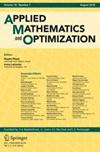由混合有限元法导出的半离散Schrödinger积分-微分方程的可观察性不等式
IF 1.7
2区 数学
Q2 MATHEMATICS, APPLIED
引用次数: 0
摘要
我们将考虑将混合有限元法用于Schrödinger积分-微分系统的半离散化。研究了半离散模型的边界可观测性问题。证明了Schrödinger型积分-微分方程的位置及其随时间的微分具有两种不同基函数的混合有限元半离散化,在离散化参数h趋于零时是一致可观测的。给出了一些数值结果来说明我们的理论发现。本文章由计算机程序翻译,如有差异,请以英文原文为准。
Observability Inequalities of a Semi-discrete Schrödinger Integro-Differential Equation Derived from a Mixed Finite Element Method
We will consider the use of mixed finite element method for the semi-discretization of the Schrödinger integro-differential systems. We investigate the problem of boundary observability for the semi-discrete models. We show that the semi-discretization based on a mixed finite element method with two different basis functions for the position and its differentiation with respect to time of Schrödinger type integro-differential equation, are uniformly observability as the discretization parameter h goes to zero. Some numerical results are given to illustrate our theoretical finds.
求助全文
通过发布文献求助,成功后即可免费获取论文全文。
去求助
来源期刊
CiteScore
3.30
自引率
5.60%
发文量
103
审稿时长
>12 weeks
期刊介绍:
The Applied Mathematics and Optimization Journal covers a broad range of mathematical methods in particular those that bridge with optimization and have some connection with applications. Core topics include calculus of variations, partial differential equations, stochastic control, optimization of deterministic or stochastic systems in discrete or continuous time, homogenization, control theory, mean field games, dynamic games and optimal transport. Algorithmic, data analytic, machine learning and numerical methods which support the modeling and analysis of optimization problems are encouraged. Of great interest are papers which show some novel idea in either the theory or model which include some connection with potential applications in science and engineering.

 求助内容:
求助内容: 应助结果提醒方式:
应助结果提醒方式:


